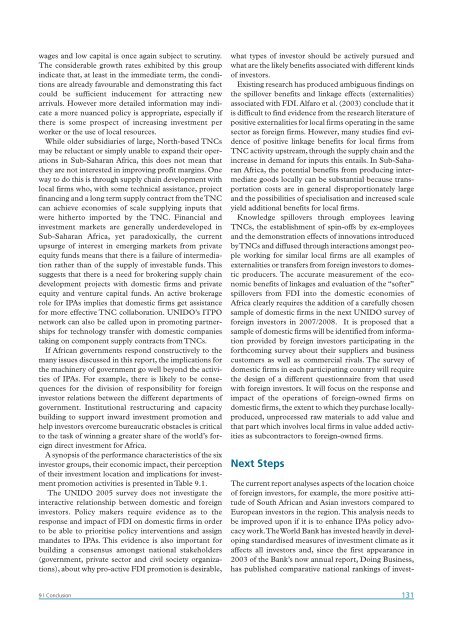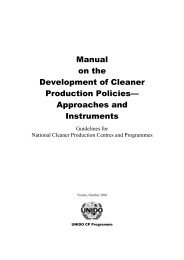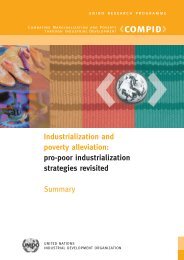Africa Foreign Investor Survey 2005 - unido
Africa Foreign Investor Survey 2005 - unido
Africa Foreign Investor Survey 2005 - unido
Create successful ePaper yourself
Turn your PDF publications into a flip-book with our unique Google optimized e-Paper software.
wages and low capital is once again subject to scrutiny.<br />
The considerable growth rates exhibited by this group<br />
indicate that, at least in the immediate term, the conditions<br />
are already favourable and demonstrating this fact<br />
could be sufficient inducement for attracting new<br />
arrivals. However more detailed information may indicate<br />
a more nuanced policy is appropriate, especially if<br />
there is some prospect of increasing investment per<br />
worker or the use of local resources.<br />
While older subsidiaries of large, North-based TNCs<br />
may be reluctant or simply unable to expand their operations<br />
in Sub-Saharan <strong>Africa</strong>, this does not mean that<br />
they are not interested in improving profit margins. One<br />
way to do this is through supply chain development with<br />
local firms who, with some technical assistance, project<br />
financing and a long term supply contract from the TNC<br />
can achieve economies of scale supplying inputs that<br />
were hitherto imported by the TNC. Financial and<br />
investment markets are generally underdeveloped in<br />
Sub-Saharan <strong>Africa</strong>, yet paradoxically, the current<br />
upsurge of interest in emerging markets from private<br />
equity funds means that there is a failure of intermediation<br />
rather than of the supply of investable funds. This<br />
suggests that there is a need for brokering supply chain<br />
development projects with domestic firms and private<br />
equity and venture capital funds. An active brokerage<br />
role for IPAs implies that domestic firms get assistance<br />
for more effective TNC collaboration. UNIDO’s ITPO<br />
network can also be called upon in promoting partnerships<br />
for technology transfer with domestic companies<br />
taking on component supply contracts from TNCs.<br />
If <strong>Africa</strong>n governments respond constructively to the<br />
many issues discussed in this report, the implications for<br />
the machinery of government go well beyond the activities<br />
of IPAs. For example, there is likely to be consequences<br />
for the division of responsibility for foreign<br />
investor relations between the different departments of<br />
government. Institutional restructuring and capacity<br />
building to support inward investment promotion and<br />
help investors overcome bureaucratic obstacles is critical<br />
to the task of winning a greater share of the world’s foreign<br />
direct investment for <strong>Africa</strong>.<br />
A synopsis of the performance characteristics of the six<br />
investor groups, their economic impact, their perception<br />
of their investment location and implications for investment<br />
promotion activities is presented in Table 9.1.<br />
The UNIDO <strong>2005</strong> survey does not investigate the<br />
interactive relationship between domestic and foreign<br />
investors. Policy makers require evidence as to the<br />
response and impact of FDI on domestic firms in order<br />
to be able to prioritise policy interventions and assign<br />
mandates to IPAs. This evidence is also important for<br />
building a consensus amongst national stakeholders<br />
(government, private sector and civil society organizations),<br />
about why pro-active FDI promotion is desirable,<br />
what types of investor should be actively pursued and<br />
what are the likely benefits associated with different kinds<br />
of investors.<br />
Existing research has produced ambiguous findings on<br />
the spillover benefits and linkage effects (externalities)<br />
associated with FDI. Alfaro et al. (2003) conclude that it<br />
is difficult to find evidence from the research literature of<br />
positive externalities for local firms operating in the same<br />
sector as foreign firms. However, many studies find evidence<br />
of positive linkage benefits for local firms from<br />
TNC activity upstream, through the supply chain and the<br />
increase in demand for inputs this entails. In Sub-Saharan<br />
<strong>Africa</strong>, the potential benefits from producing intermediate<br />
goods locally can be substantial because transportation<br />
costs are in general disproportionately large<br />
and the possibilities of specialisation and increased scale<br />
yield additional benefits for local firms.<br />
Knowledge spillovers through employees leaving<br />
TNCs, the establishment of spin-offs by ex-employees<br />
and the demonstration effects of innovations introduced<br />
by TNCs and diffused through interactions amongst people<br />
working for similar local firms are all examples of<br />
externalities or transfers from foreign investors to domestic<br />
producers. The accurate measurement of the economic<br />
benefits of linkages and evaluation of the “softer”<br />
spillovers from FDI into the domestic economies of<br />
<strong>Africa</strong> clearly requires the addition of a carefully chosen<br />
sample of domestic firms in the next UNIDO survey of<br />
foreign investors in 2007/2008. It is proposed that a<br />
sample of domestic firms will be identified from information<br />
provided by foreign investors participating in the<br />
forthcoming survey about their suppliers and business<br />
customers as well as commercial rivals. The survey of<br />
domestic firms in each participating country will require<br />
the design of a different questionnaire from that used<br />
with foreign investors. It will focus on the response and<br />
impact of the operations of foreign-owned firms on<br />
domestic firms, the extent to which they purchase locallyproduced,<br />
unprocessed raw materials to add value and<br />
that part which involves local firms in value added activities<br />
as subcontractors to foreign-owned firms.<br />
Next Steps<br />
The current report analyses aspects of the location choice<br />
of foreign investors, for example, the more positive attitude<br />
of South <strong>Africa</strong>n and Asian investors compared to<br />
European investors in the region.This analysis needs to<br />
be improved upon if it is to enhance IPAs policy advocacy<br />
work.The World Bank has invested heavily in developing<br />
standardised measures of investment climate as it<br />
affects all investors and, since the first appearance in<br />
2003 of the Bank’s now annual report, Doing Business,<br />
has published comparative national rankings of invest-<br />
9 | Conclusion<br />
131
















